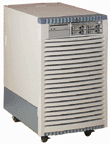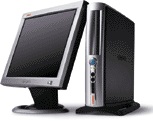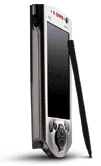Which Brand Will Win Out?
With the merger of Hewlett-Packard and Compaq Computer expected to proceed, a key question for the channel will be the direction of the companies' overlapping product lines. Here's a look at which vendor's products stand to prevail post-merger.
SERVERS

Compaq (Intel)

HP (Unix)
In the Intel-based server realm, Compaq is likely to come out on top. In the U.S. market, Compaq led the Intel server market last year with revenue of $1.8 billion vs. just $261 million for HP, which was No. 4, according to research firm Gartner Dataquest.

\
HP rp8400 Unix server
Both companies offer one-way to four-way Intel servers. HP recently refreshed its Intel server line with seven new models, ranging from a $1,099 Pentium 4 server to the industry's first Xeon MP-based models. Compaq, however, also provides eight-way Xeon-based models, was the first to market with Intel-based blade servers and soon plans to release two-way and four-way Foster-based servers as well as a new eight-way server.
"[Compaq ProLiant is the strong brand," said Rich Baldwin, president of Nth Generation Computing, a San Diego-based solution provider. "I suspect [HP servers will become ProLiant. But the ProLiant line will take on some HP features."
Baldwin, though, expects HP to take the lead in Unix-based servers because of its experience with Intel's Itanium processors. Both HP and Compaq plan to migrate from their current RISC processors to the Itanium platform and to integrate their Unix operating systems into one OS.
In 2001, HP was No. 3 in the Unix server market with sales of $1.3 billion, followed by Compaq with sales of $391 million. Both companies now offer
single-processor to 16-way midrange Unix servers based on their proprietary processors. HP's Superdome currently scales to up to 64-way but is slated to be available in a 128-way configuration next year. Compaq's AlphaServer scales to up to 32 processors.
HP already offers two first-generation Itanium-based servers and plans new models next year. It also plans to produce its PA-RISC servers until 2005 and support its PA-RISC server lines until at least 2015. Compaq's road map calls for Marvel-based AlphaServers to become available next year, with new EV79 processor servers following in mid-2004. The company plans to sell Alpha-based systems until 2006 or 2007 and to support them for at least five years afterward.
PCs

Compaq

\
Compaq d500 desktop PC
Market share won't determine the winner in this category. In fourth-quarter 2001, Compaq shipped 1.4 million PCs, giving it the No. 2 spot in the market after Dell Computer (3 million units) but barely ahead of No. 3 HP (1.3 million units), reported research firm IDC.
Compaq's PC line is more entrenched in the market than HP's, which means that many customers already have Compaq products on their standards lists, said Steven Manteros, general manager at GST/Micro City, a Cerritos, Calif.-based solution provider.
On the laptop front, Compaq's Evo notebooks hold greater market share and should edge out HP's notebook line, although HP offers better quality, said Todd Barrett, networking sales manager at CPU Sales and Service, a Waltham, Mass.-based solution provider.
STORAGE

Compaq
Compaq is by far the bigger storage player. Last year, it sold $2.7 billion in external storage arrays vs. HP's sales of $1.2 billion, according to IDC. Much of Compaq's storage strength is in open systems, where it leads the market with external storage revenue of $3.7 billion, nearly double HP's sales.
At the high end of the storage market, HP is expected to continue to OEM its XP array series from Hitachi Data Systems. Compaq currently has no similar product but is expanding the enterprise possibilities of its modular storage arrays. Don Richie, president of Sequel Data, an Austin, Texas-based solution provider, said he expects HP to keep its Hitachi OEM relationship until the Compaq arrays have scaled to the point where they can take over.
In the midrange area, there's noticeable overlap. Most of HP's midrange storage products attach to HP environments, while Compaq's offerings attach to Compaq environments. Yet Tom Rallens, worldwide marketing manager for HP's network storage solutions unit, said Compaq's midrange storage products are better able to attach to heterogeneous environments and that HP acknowledges Compaq's strength in the Windows-based storage space.
MOBILE

Compaq

\
Compaq iPaq handheld
In terms of sell-in to the enterprise, Compaq's iPaq PocketPC,with greater brand recognition and add-ons for security and other enterprise-centric applications,maintains the edge over HP's Jornada PocketPC. At the end of 2001, Compaq owned 9.6 percent of the global handheld market vs. 6.2 percent for HP, according to IDC.
So far, Compaq and HP have differed little in handheld design. Both have similar form factors, both plan to offer integrated wireless/voice capabilities this year and both support Bluetooth technology. But what's not clear are next-generation product plans.
"The question is where HP is headed from a [product road-map perspective," said Dan Elliott, vice president of mobile solutions at CompuCom, a Dallas-based solution provider. "It could end up being a combo of two technologies and neither one coming out with the product that takes the lead."